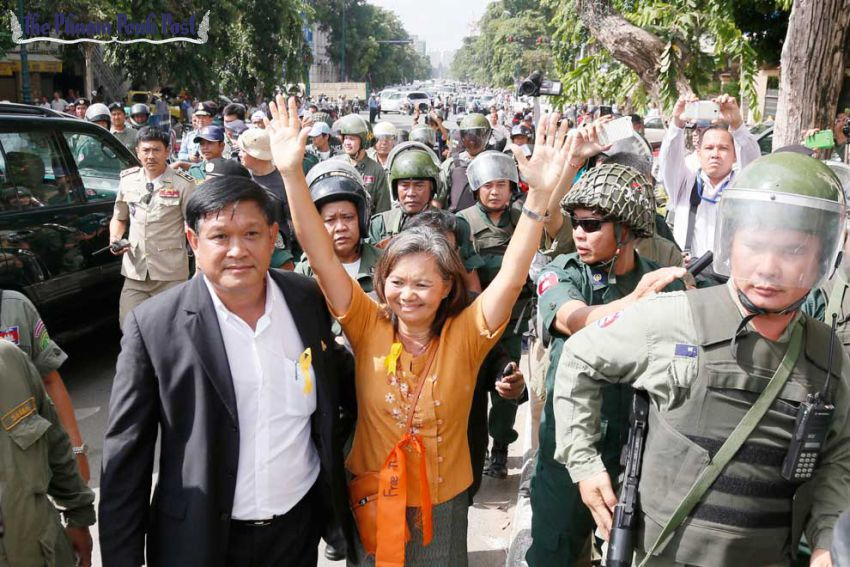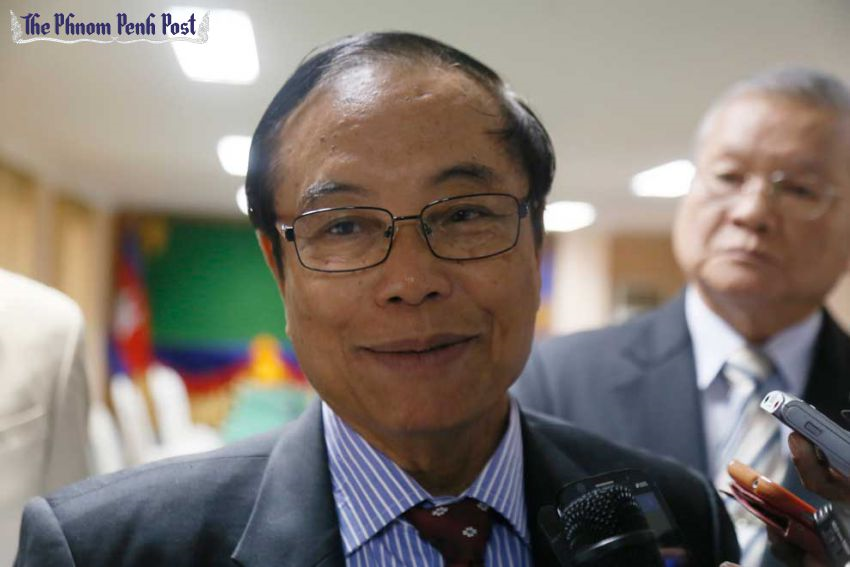|
(보도) Reuters 2015-1-19 (번역) 크메르의 세계
캄보디아 훈센 총리, "야당 국회의원들 구속" 위협
Threats of jail, walkout put Cambodia truce on shaky ground
|

|
|
(자료사진: Reuters/Chaiwat Subprasom) 캄보디아의 훈센 총리가 2014년 12월 20일 태국 방콕에서 개최된 제5차 확대 메콩유역(Greater Mekong Subregion: GMS) 정상회의에서 연설하는 모습. |
기사작성 : Prak Chan Thul
(프놈펜/로이터) ---- 캄보디아의 훈센(Hun Sen) 총리는 월요일(1.19) 야당인 '캄보디아 구국당'(CNRP)을 맹비난하면서, 야당 국회의원들을 감옥에 보내겠다고 위협했다. 그는 야당이 정치적 휴전 조건을 위반하여 상황을 점점 불안정하게 한다고 비난했다.
훈센 총리는 사법부에 대해 야당인 CNRP 당원 19명에 대한 재판을 서둘러달라고 촉구했다. 이들 19명에는 반란죄 혐의가 적용된 상태인데, 그 중 7명은 국회의원들이다. 이에 대해 야당은 다시금 국회 등원을 거부할 것이라고 새로운 경고를 보내면서 반발했다.
훈센 총리의 집권 '캄보디아 인민당'(CPP)과 그 맞수인 CNRP는 작년 7월에 정치적 휴전에 합의한 바 있다. CNRP는 노조와 도시민들의 지지를 받는 정당으로서, 독자적 스타일의 "독재자"(strongman)인 훈센 총리의 집권 30년 가운데 최대의 정치적 위협이 되고 있다.
훈센 총리는 월요일 한 학교의 행사에 참석해 연설하면서 다음과 같이 말했다.
|
법원은 재판을 가능한 한 빨리 진행해주길 호소하는 바이다. 나는 이렇게 말하고 싶다. 당신들은 아직 피해나간 것이 아니다. 야당 국회의원 7명은 여전히 징역형의 가능성에 직면해 있다. |
입건된 야당 당원들은 작년(2014) 1월에 강제로 폐쇄됐던 농성장인 '프리덤 파크'(Freedom Park, 자유공원)를 위력을 통해 다시 개장하려 시도하다가 반란죄 혐의로 고발당했다. [2013년 7월 총선 이후] '프리덤 파크'는 야당의 훈센 정권 타도 시위의 집회장 겸 농성장으로 사용된 곳으로서, 법적으로는 프놈펜(Phnom Penh)의 유일한 시위 허용장소이기도 하다.
CNRP는 지난 총선이 부정선거라고 말하면서 2013년 중반부터 2014년에 걸쳐 국회 등원을 거부하고 항의시위를 벌였다. 이 시위가 조직적인 집회들과 노조의 파업이 겹쳐지고, 일부 경우 폭력사태로까지 변하면서 훈센 정권은 곤혹을 치뤘다.
CNRP는 2014년에 거의 1년만에 국회에 등원했다. 국회 등원의 조건은 각종 상임위원회 위원장 자리를 여야가 동수로 나눠갖는다는 것이었다. 하지만 대부분의 전문가들은 여야 양측이 근래에 칭송했던 "새로운 대화 문화"에 관해 회의적이다.
훈센 총리는 월요일 연설에서 CNRP가 자신에 대한 인신공격을 함으로써 휴전을 깼다고 비난했다.
야당 중진인 무 소쿠(Mu Sochua) 의원도 고발당한 국회의원 7인 중 한명이다. 그녀는 어제 정부가 여야 합의사항을 존중하지 않는 것은 그들의 자유라면서, 다음과 같이 말했다.
|
우리 CNRP는 정부에 대해 국가적 현안들을 해결하라고 요구했다. 문제들이 해결 없이 더 심각해진다면, 우리가 이미 말했듯이 국회에서 다시 걸어나올 것이다. |
정치평론가 소팔 에아(Sophal Ear) 씨는 여야간 평화가 위기에 처했다면서, 훈센 총리가 현재 매우 익숙한 전술을 구사하는 것이라고 평했다. 그는 다음과 같이 말했다.
|
대화의 문화가 파괴되고 있고, 위협과 [당국의 불법행위에 대한] 면책의 문화에 길을 내주고 있다. 이미 보아왔던 전략이지만, 진행되는 일은 본질적으로 국민들을 더 잘 통제하기 위해 사용하는 수감의 위협이다. |
(편집: Martin Petty)
(보도) The Phnom Penh Post 2014-1-20
Convict the CNRP 7: PM
(링크: http://www.phnompenhpost.com/national/convict-cnrp-7-pm)
기사작성 : May Titthara 및 Daniel Pye
|

|
|
(자료사진: The Phnom Penh Post / Vireak Mai) 2014년 7월, 야당 중진 무 소쿠 의원이 당국에 체포되던 장면. |
Seven opposition lawmakers charged with inciting violence during a protest in Phnom Penh last year were not covered by parliamentary immunity for their alleged crimes and should be prosecuted as soon as possible, Prime Minister Hun Sen said yesterday.
The Cambodia National Rescue Party lawmakers were arrested following a July 15 protest at Phnom Penh’s Freedom Park where several district security guards were badly beaten by opposition supporters.
The lawmakers were charged with leading an insurrection, instigating violence and inciting others to commit crimes – charges the MPs deny. The group was released after CNRP president Sam Rainsy and Hun Sen penned a deal on July 22 to end almost a year of political stalemate after the 2013 election.
After the deal was signed, the opposition lawmakers took up their seats in parliament and assumed the immunity from prosecution that goes with it. But in a speech to graduating students in Svay Rieng province yesterday, Hun Sen said the immunity should not protect them in this instance.
“I, Hun Sen, as an MP and also leader of the … [ruling Cambodian People’s Party] do not support the dismissal of the seven court cases of the CNRP lawmakers, because your immunity was granted after you were charged,” he said.
He added that it would take three-quarters of the country’s 123 elected representatives to vote in favour of extending the lawmakers’ immunity to cover the period before they took their seats. “The political compromise is not effective with these outstanding criminal complaints. I call on the court to prosecute and convict them as soon as possible,” he said.
Opposition supporters and rights groups have condemned the charges as politically motivated and aimed at applying pressure to the CNRP during sensitive discussions.
But Hun Sen insisted yesterday that this was not the case. “I respect the court, even though [the CNRP] is always saying that the CPP and Hun Sen use the courts as a tool.”
Rainsy sought to play down Hun Sen’s comments yesterday, saying his party’s aim was to reduce tensions between the CNRP and CPP while negotiations over the amendment of laws relating to elections and the reform of the National Election Commission were still ongoing. “We want to diffuse the tension; this is the spirit of the July 22 agreement,” Rainsy said. “We fully respect the letter of this agreement. There are already too many people in jail,” he added, referring to five CNRP members and supporters who were also arrested after the July 15 violence.
Hun Sen, however, called on Rainsy to enter into direct negotiations over the fate of the seven lawmakers. “Sam Rainsy must come to negotiate with me on the matter, but I must say that I will not agree [with Rainsy].… I don’t mean to pick a fight with anyone. I only desire harmony,” he said.
While Rainsy tried to dismiss the spat, saying that it stemmed from a “misunderstanding” and would only be “temporary”, Mu Sochua, one of the seven lawmakers charged last year, said Hun Sen’s comments represented a threat to judicial independence. “It is a clear threat to the justice system.… We have strict immunity, and to change that you need three-quarters of [the] votes, which the CPP cannot achieve,” she said. “This is also a threat against the people, because we represent the people. “We were wrongly detained and wrongly charged,” she went on to say.
Sochua was charged under Article 459 of the Criminal Code, along with fellow lawmakers Men Sothav Rin, Ho Vann, Real Camerin, Keo Phirom, Long Ry and Nuth Rumduol.
In the 2013 election, the CPP won 68 seats in the legislature, while the CNRP, led by Rainsy and Kem Sokha, won the remaining 55 seats. The opposition rejected the results, claiming widespread voter fraud. The months that followed were punctuated by frequent street protests and violent government crackdowns, culminating in the deaths of at least five people and the destruction of an opposition protest camp at Freedom Park.
Working groups from both parties continue to hold twice-weekly meetings to negotiate the details of the political deal signed last year, although there are signs that Hun Sen’s patience may be wearing thin.
During his speech yesterday, the prime minister said that if the CNRP negotiators failed to agree with the CPP’s proposals, they could be brought to parliament and voted on by MPs. Rejecting the proposals would then need more than 50 per cent of sitting MPs to vote with the CNRP, which holds less than 45 per cent of the seats in Cambodia’s legislature.
|

|
|
(사진: The Phnom Penh Post / Heng Chivoan) 여야협상의 여당측 주 창구 역할을 맡고 있는 빈 친 부총리가 1월19일 국회에서 야당 대표단과 대화를 가진 후 기자들의 질문에 답하고 있다. |
Bin Chhin, a deputy prime minister and lead CPP negotiator, said that time was running out for an agreement to be made without the proposals being taken to the National Assembly. “When the leaders meet and disagree, the only solution is to put the draft law from the CPP and the draft law from the CNRP to parliament. Whichever one parliament approves, we will take that one,” he said. “If there is still disagreement after the debates, we will tell the CNRP what my leader has told us to do – we will send [the laws] to parliament.”
However, he added that there was still a chance the working groups would come to an agreement as more than half of the articles needing amendment had already been drafted and agreed on.
CNRP president Rainsy said he was not unhappy with the progress of the negotiations. “So far, so good,” he said.
ADDITIONAL REPORTING BY MEAS SOKCHEA
| 
